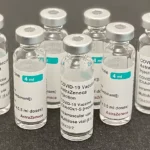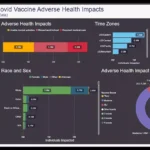The Key Points
- London-based DNA testing firm Atlas Biomed has mysteriously ceased operations, leaving customers unable to access their genetic data.
- The company had ties to Russia, with some executives linked to a prominent Moscow address.
- Sensitive customer information, including genetic data, personal details, and health insights, is now in limbo.
- The case raises broader concerns about private companies' security and ethical handling of genetic data.
- Past breaches in the DNA testing industry highlight the need for greater regulation and transparency.
A Disappearing Act Leaves Genetic Data in Limbo
In a move that has left its customers reeling, London-based DNA testing company Atlas Biomed has vanished, taking access to vast troves of genetic data. Once a trusted name for providing insights into ancestry, health, and fitness, the company has ceased communication, shuttered its online presence, and closed its offices.
Customers now face an unsettling reality: their most sensitive personal information is out there, and no one knows who controls it.
Reports suggest troubling ties between the now-defunct company and individuals connected to Russia. Four Atlas Biomed executives have resigned, while the remaining directors are linked to a prominent Moscow address. This, coupled with a complete lack of transparency about the company's current status, has sparked a flurry of concern over the security and potential misuse of genetic data.
A Troubled History Unfolds
Atlas Biomed's abrupt disappearance is only the latest chapter in a string of controversies surrounding the DNA testing industry. The stakes are incredibly high in a marketplace that promises personal insights through genetic analysis. Customers entrust these companies with intimate biological data, often without fully grasping the risks.
The now-defunct Atlas Biomed had previously assured clients that their data was securely stored on GDPR-compliant servers within the European Union.
However, customers were never allowed to download or retain their data independently, leaving them reliant on the company’s online platform, which has since gone offline.
“I have a history of 16 tests I can’t now access, hundreds of pounds invested,” lamented one frustrated customer on social media.
Others reported paying for services they never received, raising suspicions about the company’s business practices long before its disappearance.
A Dark Side to DNA Testing
The mystery of Atlas Biomed’s vanishing act sheds light on broader risks inherent in the DNA testing industry. While these services offer powerful tools for personal discovery—helping individuals learn about their ancestry or genetic predispositions—they also create digital records that can be vulnerable to breaches, misuse, and exploitation.
The industry has already faced numerous high-profile data scandals. In 2018, MyHeritage experienced a breach that exposed the email addresses and hashed passwords of 92 million users.
The following year, Blackstone acquired Ancestry, sparking concerns about how genetic data might be monetized under its new ownership. Most recently, in 2023, cybercriminals stole the genetic information of nearly seven million 23andMe customers, selling it on underground forums.
Atlas Biomed’s potential ties to Russia have heightened fears about how sensitive data might be used or weaponized. Genetic information and personal identifiers are a treasure trove for advertisers, insurers, and governments with nefarious intentions.
Warnings From Cybersecurity Experts
Security firms and consumer advocates have long warned about the potential pitfalls of DNA testing. While the benefits of personalized medicine and ancestry insights are undeniable, the risks are often overlooked. Cybersecurity experts recommend extreme caution before submitting genetic samples.
“Research the company you want to trust with your data thoroughly,” advises Malwarebytes, a leading cybersecurity firm. They also suggest minimizing the personal information shared with such firms, using pseudonyms or separate email accounts to limit traceability.
For those already invested in the industry, Atlas Biomed's disappearance is a stark reminder of the need for transparency and regulatory oversight.

Genetic data, once exposed, is permanent, and its misuse can have lifelong consequences. From targeted marketing to racial profiling, the implications are far-reaching.
What Happens Next?
The disappearance of Atlas Biomed raises critical questions about the future of DNA testing and the broader implications of unregulated genetic data handling.
Regulators, including the UK's Information Commissioner’s Office (ICO), have confirmed receiving complaints about the company but have yet to provide updates on their investigations.
For customers, the immediate concern is regaining access to their data and understanding its current status. However, the more significant issue is systemic: how can consumers be assured their genetic information is handled ethically, securely, and transparently?
Lawmakers and consumer advocacy groups will likely use this incident as a rallying cry for greater industry oversight. DNA testing companies must establish clear data storage, access, and portability guidelines to ensure that users can retain control over their most sensitive information.
Lessons From the Atlas Biomed Saga
The Atlas Biomed debacle is a wake-up call for consumers and industry players. As DNA testing becomes increasingly mainstream, the stakes will only grow higher. Customers must demand transparency, and companies must prioritize ethical practices over profit.
The key takeaway for DNA testing is clear: proceed with caution. Research the company thoroughly, understand the terms of data usage, and think critically about whether the potential benefits outweigh the risks. One cybersecurity expert aptly said, “The best protection is prevention.”
The mystery of Atlas Biomed's disappearance may take time to unravel fully, but its legacy is already apparent. It has sparked a broader conversation about the ethics of genetic data handling and underscored the urgent need for reform in an industry at the intersection of technology and identity.

Lifelong bacon junkie. Lifelong internet fanatic. Hipster-friendly travel aficionado. Twitter lover. Avid food buff. Incurable travel trailblazer.













